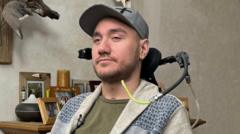Although other firms have developed similar technologies, Neuralink's connection to Musk has drawn significant media attention, perhaps overshadowing the scientific innovation itself. As Noland embraces his newfound independence, expressing excitement over being able to play chess and video games again, he remains cognizant of the risks involved. He stated, “Good or bad, whatever may be, I would be helping” in the advancement of such technologies.
However, with this remarkable progress comes potential ethical dilemmas, particularly concerning privacy and control over one's thoughts. Experts caution that with access to brain activity, personal data could be vulnerable, raising questions about the implications of such invasive surgeries. Despite these challenges, Noland is hopeful about the future capabilities of the chip, envisioning a time when he could control additional devices, including a wheelchair or even a humanoid robot.
Issues with the device’s functionality have arisen, illustrating the ongoing technological challenges that must still be addressed. A malfunction once left Noland unable to control his computer; nevertheless, engineers rectified the disconnection, suggesting resilience amidst hurdles in the development of BCI technology.
Neuralink isn't alone in exploring brain-computer interfaces; other companies like Synchron are also pioneering alternatives aimed at aiding individuals with severe neurological conditions, employing less invasive implantation techniques. As the industry continues to expand, the quest for greater understanding of the brain and its capabilities stands poised at the forefront of medical science.
Noland Arbaugh views his personal journey with Neuralink as a crucial step in understanding the brain's potential. He emphasizes that this experience is just the beginning of what could one day become reality for many, hinting at a future where technology can significantly transform lives while simultaneously navigating the fine lines of ethics in science.
However, with this remarkable progress comes potential ethical dilemmas, particularly concerning privacy and control over one's thoughts. Experts caution that with access to brain activity, personal data could be vulnerable, raising questions about the implications of such invasive surgeries. Despite these challenges, Noland is hopeful about the future capabilities of the chip, envisioning a time when he could control additional devices, including a wheelchair or even a humanoid robot.
Issues with the device’s functionality have arisen, illustrating the ongoing technological challenges that must still be addressed. A malfunction once left Noland unable to control his computer; nevertheless, engineers rectified the disconnection, suggesting resilience amidst hurdles in the development of BCI technology.
Neuralink isn't alone in exploring brain-computer interfaces; other companies like Synchron are also pioneering alternatives aimed at aiding individuals with severe neurological conditions, employing less invasive implantation techniques. As the industry continues to expand, the quest for greater understanding of the brain and its capabilities stands poised at the forefront of medical science.
Noland Arbaugh views his personal journey with Neuralink as a crucial step in understanding the brain's potential. He emphasizes that this experience is just the beginning of what could one day become reality for many, hinting at a future where technology can significantly transform lives while simultaneously navigating the fine lines of ethics in science.

















